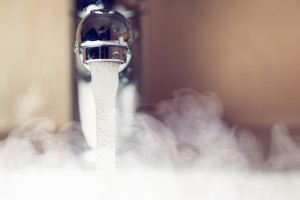 Did you know a hot water heater is a home’s second biggest energy-user, and responsible for about 18% of your monthly energy bill? Checking and adjusting the temperature on your system can help save money and extend the life of your unit.
Did you know a hot water heater is a home’s second biggest energy-user, and responsible for about 18% of your monthly energy bill? Checking and adjusting the temperature on your system can help save money and extend the life of your unit.
Before you check your water heater’s current temperature, consider: If you turn your shower water on as hot as it can go, would it be too hot to shower? If so, your heater is likely set too high.
Ideal Hot Water Heater Temperature
On the other hand, it’s possible to have the water heater temperature set too low. This not only means cool showers, but a setting below 120°F can allow bacteria to develop inside the tank. That stagnant water can produce bacteria like Legionella, which can cause a severe flu-like illness.
According to the EPA, the best temperature for your hot water heater is 120°F, but can vary depending on your home.
Water Heater Temperature Factors
A number of factors play into setting the temperature. Consider:
- Plumbing material in your home (copper, plastic, PEX)
- Gas or electric hot water heater
- Traditional tank or tankless hot water heater
Reasons to set your hot water heater between 120-140°F:
- Above average water usage from large family
- Dishwasher doesn’t pre-heat water (needed to kill bacteria on dishes)
- Someone living in the home suffers from a respiratory disease or weakened immune system
The current temperature will be displayed on the unit’s dial. You can also turn your hot water on and take a temperature reading from the faucet.
Savings with a Lower Water Heater Temperature
It’s estimated that lowering the temperature by 10°F can save 3-5% on your energy bill yearly. So take into account the above factors to decide what’s best.
Solutions for Water Heater Temperature Problems
If you want to avoid bacteria growth, but 140°F makes running water too hot, opt for a hot water tank booster. Tank boosters mix cold water from the input valve with hot water from the hot water valve. This allows the unit to store water at a higher temperature, cooling it before it reaches the faucet and preventing bacteria overgrowth.
For homes with multiple people and units that take a while to heat the water, a hot water circulating system is ideal. This system keeps hot water moving through the pipes so it doesn’t cool before reaching the tap.
